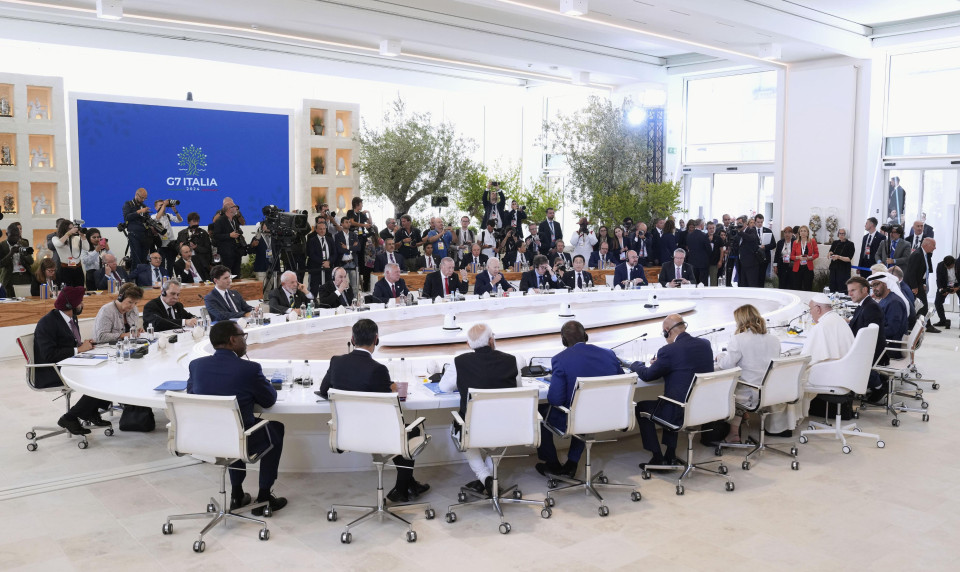Group of Seven leaders on Friday ramped up pressure on China to curb its provocative activities in the Indo-Pacific region, and condemned Russia and North Korea for deepening their military ties amid the former's invasion of Ukraine.
While agreeing to fresh financial aid for the war-torn eastern European country, the major industrialized democracies warned Israel not to worsen the already deteriorated humanitarian situation in the Gaza Strip in its offensives against the militant group Hamas.
With China's growing maritime assertiveness in mind, the G7 leaders reiterated their "strong opposition to any unilateral attempt to change the status quo" in the East and South China seas in a joint statement released after the second day of their summit in Italy.
Expressing their "deep concern" over China's support for Russia, the leaders also demanded that Beijing "press Russia to stop" its aggression against Ukraine and halt "the transfer of dual-use materials" to Moscow.

The G7 condemned "the increasing military cooperation between North Korea and Russia," including Pyongyang's export of ballistic missiles in violation of U.N. Security Council resolutions and Russia's use of them against Ukraine.
To step up financial aid to Ukraine, the G7 agreed to provide about $50 billion in loans for the country using interest from frozen Russian sovereign assets, and reaffirmed their "commitment to Ukraine's long-term security" and the goal of realizing "a just, lasting and comprehensive peace."
As for the conflict between Israel and Hamas, the G7 said Israel "must fully comply with its obligations under international law in all circumstances, including international humanitarian law."
The communique was issued after the conclusion of substantial discussions in Fasano, southern Italy, and before Italian Prime Minister Giorgia Meloni, the summit's chair, holds a press conference on Saturday to wrap up the three-day gathering.
During a Friday session concentrating on the "Indo-Pacific and economic security," the G7 leaders confirmed they will work together closely to grapple with matters concerning China and North Korea, Japan's Foreign Ministry said.
"The security of the Indo-Pacific region and Europe are inseparable," Japanese Prime Minister Fumio Kishida was quoted by the ministry as telling the session, apparently with Beijing's maritime aspirations and Russia's aggression against Ukraine in mind.
The G7 also reaffirmed the importance of peace and stability across the Taiwan Strait, where China's military provocations have been seen, calling it "indispensable to international security and prosperity" and demanding a "peaceful resolution" of tensions between Beijing and Taipei.
China's ruling Communist Party has been intensifying military pressure on Taiwan. Beijing views the self-ruled democratic island as a renegade province to be reunified with the mainland, by force if necessary.
As for the South China Sea, the G7 expressed "serious concern about the increasing use of dangerous maneuvers and water cannons against Philippine vessels" near disputed shoals, resulting in severe damage to a vessel and injuries to its crew.
China believes it has sovereignty over almost the entire sea, although a 2016 international tribunal ruling invalidated its claim. Brunei, Malaysia, Vietnam, Taiwan and the Philippines claim parts of the resource-rich waters, home to some of the world's busiest sea lanes.
On the economic front, the G7 members raised China's "nonmarket policies and practices" that they said are leading to "harmful overcapacity," amid mounting concerns about the negative impact of excessive Chinese industrial production in sectors such as electric vehicles and solar panels that have had government support.
Meanwhile, the leaders said they "seek constructive and stable relations with China" and that they are "not trying to harm China or thwart its economic development."
The G7 pledged to launch an action plan on the use of artificial intelligence following a session on Friday joined by Pope Francis, who aired his concerns over the use of AI for military purposes and called for tightened regulations.
Francis became the first pope to attend the G7 talks.
Recalling the G7's first-ever document on nuclear disarmament, dubbed the Hiroshima Vision and announced at last year's summit hosted by Kishida in the western Japan city, the leaders said they remain committed to "disarmament and nonproliferation efforts, with the ultimate goal of a world without nuclear weapons."
Related coverage:
Japan, Ukraine sign deal for long-term support amid Russian war
G7 leaders agree to provide at least $50 billion in aid for Ukraine
PM Kishida to lead session on China, Indo-Pacific at Italy G7 summit
 By Keita Nakamura,
By Keita Nakamura,









